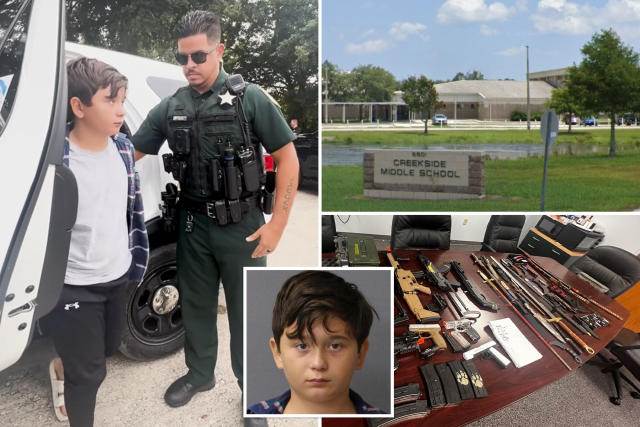
In a quiet Florida town, an alarming incident has left both parents and law enforcement on edge. An 11-year-old boy, Carlo "Kingston" Dorelli, has been arrested and charged after a joke about a mass shooting spiraled into a terrifying reality for his community.
It started innocently enough—schoolyard chatter. But when Dorelli began bragging to classmates about a chilling "kill list" and showing off a video of his arsenal, things took a dark turn. Airsoft rifles, knives, swords—these weren’t the typical toys one might expect to find in a child’s room. The cache was extensive, and for the authorities, it was all too real. As one classmate put it, "At first, we thought he was just messing around.
But then he showed us the video. That’s when we knew it wasn’t just talk."

When questioned, Dorelli insisted the threats were a joke—something to impress his peers, nothing more. But the local sheriff’s office wasn’t laughing.
Following a search of his home, investigators found more than just toys. Dorelli had created a written "kill list," detailing potential targets at Creekside and Silver Sands Middle Schools. "He said it was all for fun," Sheriff Mike Chitwood remarked, "but in today’s climate, that’s a line you don’t cross."
In a bold move to send a strong message, Sheriff Chitwood decided to make an example out of Dorelli.
True to his promise of publicly shaming those who threaten violence, Dorelli was not just arrested—he was "perp-walked." In full view of the public, the 11-year-old was escorted in handcuffs, his head down, while cameras flashed. "Every time we make an arrest, your kid’s photo is going to be put out there," Chitwood declared, making it clear that no juvenile is too young to face the consequences.
This was not just an arrest—it was a public spectacle, designed to make sure the message got through: school threats, even as a joke, will not be tolerated.

For the residents of Port Orange, the news hit hard.
"We send our kids to school expecting them to be safe," one parent remarked. "Now, we don’t even know if we can trust the children they’re sitting next to." The incident has ignited fierce debate over school safety, mental health, and parental responsibility. "It’s not just about punishing the kids," another resident said. "We need to look at why they’re acting this way in the first place."
Dorelli’s case is part of a growing trend across the United States. Juveniles making threats—real or imagined—are increasingly common, but the root cause is harder to pin down. Some experts suggest that the prevalence of violent video games and media might desensitize young minds. Others point to the mental toll of growing up in a world where school shootings dominate headlines.
"These kids are acting out their fears in the worst possible way," a child psychologist explained. "They’re testing boundaries, not fully understanding the weight of their actions."

With tensions high and communities on edge, the question remains: How do we prevent this from happening again? Law enforcement’s approach is one way—publicizing arrests and enforcing strict penalties.
But many argue that a deeper, more compassionate approach is necessary. "This isn’t just about punishing them," Sheriff Chitwood said. "We need to figure out what’s going wrong in these kids’ lives before it gets to this point."
With juvenile threats on the rise and safety in schools becoming an urgent issue, we want to hear from you.
How should communities handle cases like Carlo Dorelli’s? Should law enforcement crack down even harder, or do we need more focus on prevention and rehabilitation? Share your thoughts in the comments below.



















